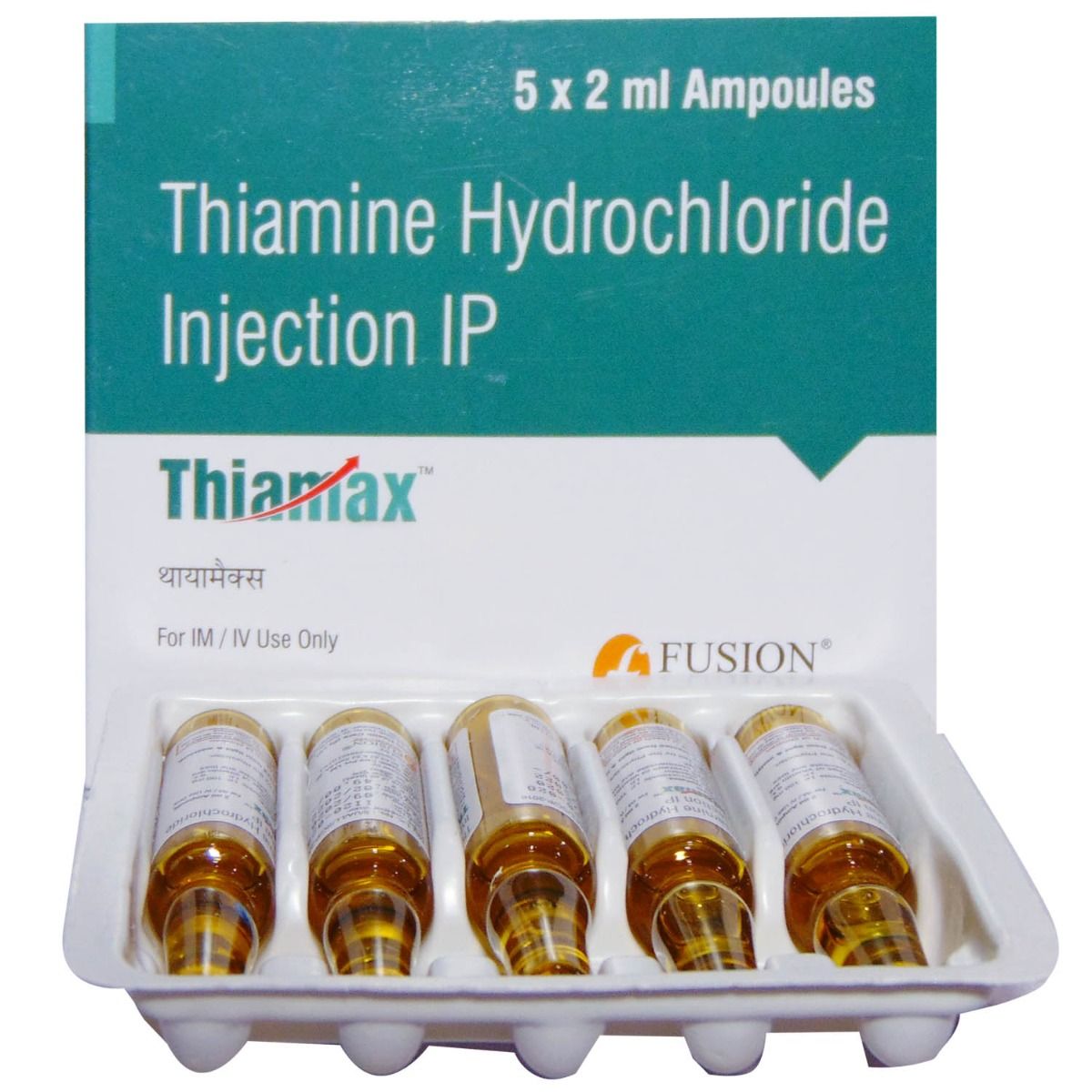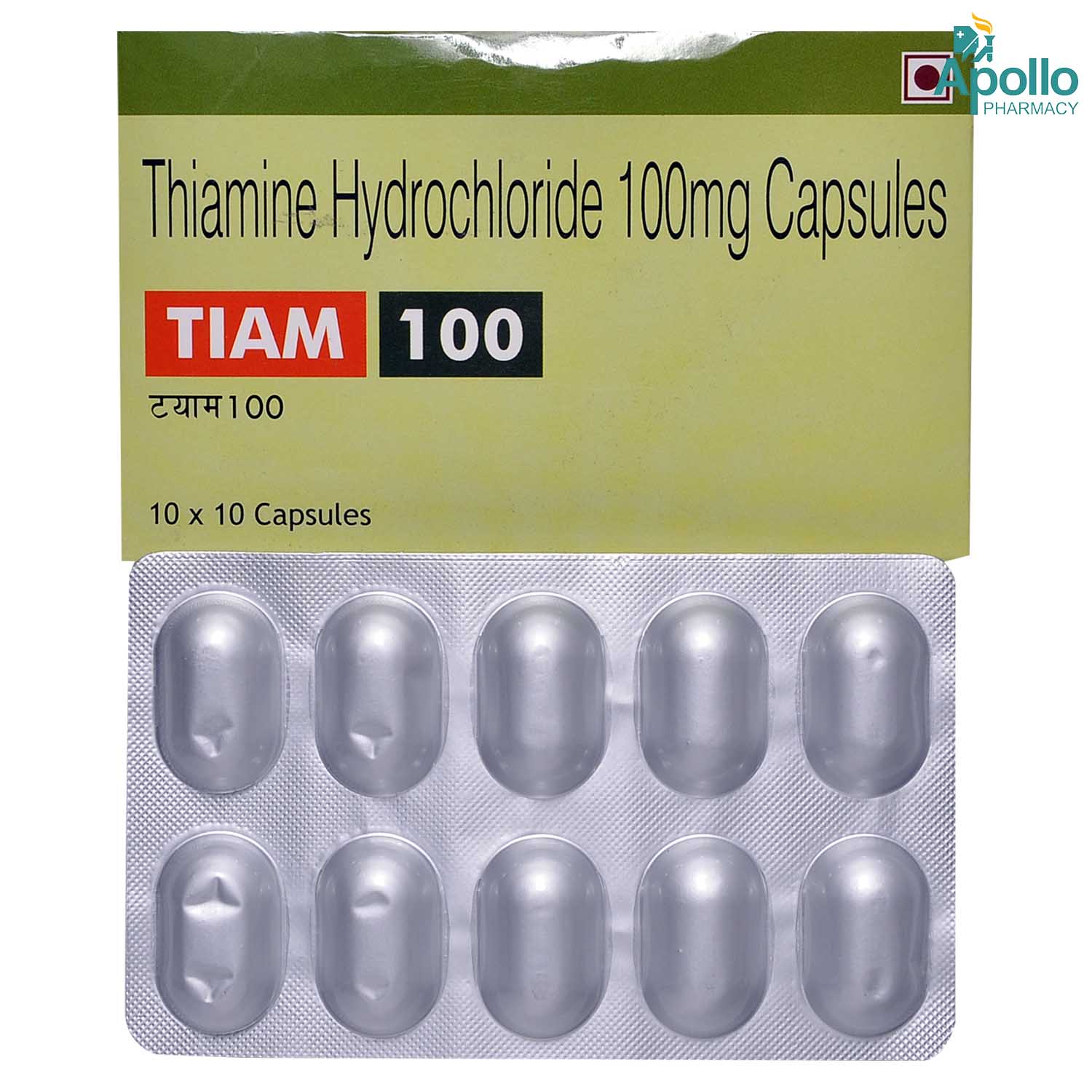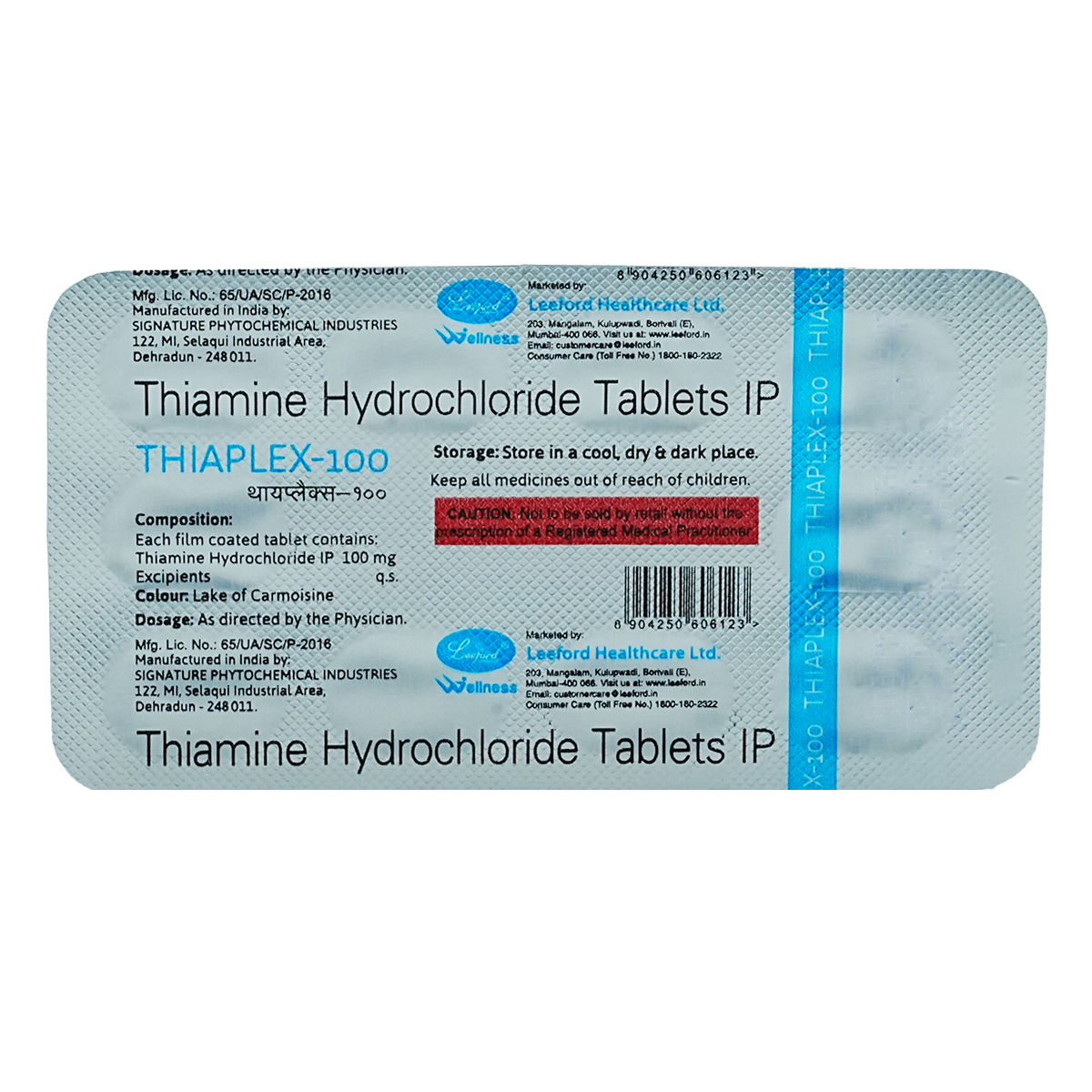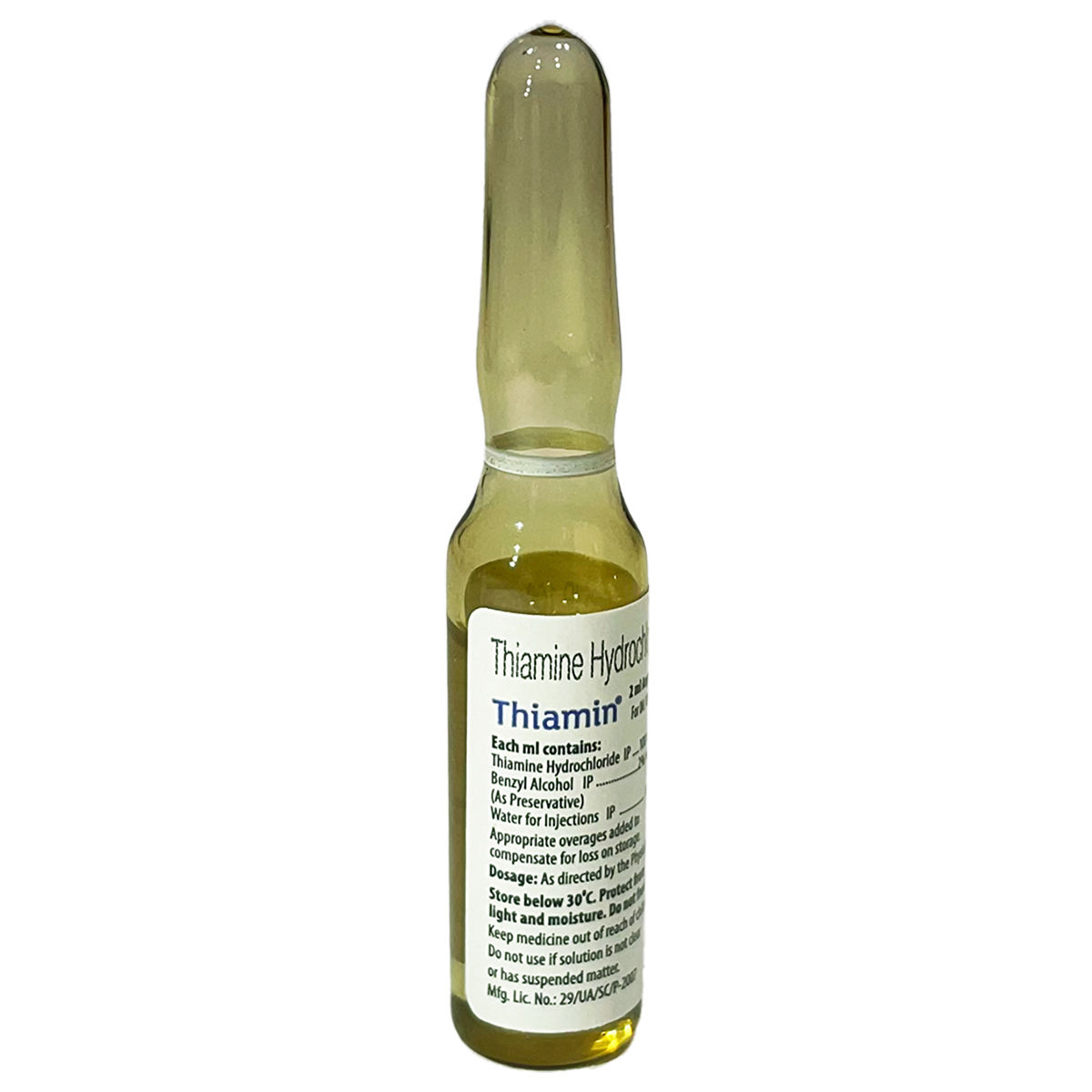Thiamax Injection 100Mg 2 ml
Thiamax Injection 100Mg 2 ml is used to treat Thiamine deficiency or beriberi, deficiency related to chronic alcoholism, and Wernicke-Korsakoff syndrome. It contains Thiamine (Vitamin B1), which gives the body critical nutrients. It is also appropriate in patients with established thiamine deficit who are unable to take thiamine/vitamin B1 orally due to concurrent severe anorexia, malabsorption, nausea, or vomiting.
₹40.5*
MRP ₹45
10% off
₹38.25*
MRP ₹45
15% CB
₹6.75 cashback(15%)
Free Delivery
With Circle membership
(Inclusive of all Taxes)
This offer price is valid on orders above ₹800. Apply coupon PHARMA10/PHARMA18 (excluding restricted items)
Know Your Delivery Time
Provide Delivery Location



Available Offers
 Prescription drug
Prescription drugWhats That

Secure Payment

India's Most Trusted Pharmacy

Genuine Products
Synonym :
Composition :
Manufacturer/Marketer :
Consume Type :
Return Policy :
Expires on or after :
About Thiamax Injection 100Mg 2 ml
Thiamax Injection 100Mg 2 ml is a vitamin supplement that is used to prevent and treat thiamine deficiency or beriberi, a deficiency related to chronic alcoholism and Wernicke-Korsakoff syndrome. Thiamax Injection 100Mg 2 ml is also used when giving IV dextrose to individuals with marginal thiamine status to prevent the precipitation of heart failure.
Thiamax Injection 100Mg 2 ml includes Thiamine (Vitamin B1), which works by giving critical nutrients to the body. Thiamax Injection 100Mg 2 ml is also appropriate in patients with established thiamine deficit who are unable to take thiamine/vitamin B1 orally due to concurrent severe anorexia, malabsorption, nausea, or vomiting.
Thiamax Injection 100Mg 2 ml will be administered by a healthcare professional; do not self-administer. In some cases, Thiamax Injection 100Mg 2 ml may cause side effects such as weakness, nausea, restlessness, sweating, and a feeling of warmth. Most of these side effects do not require medical attention and will resolve gradually. However, if the side effects persist or worsen, consult a doctor.
Inform the doctor if you are allergic to any of the components in Thiamax Injection 100Mg 2 ml. Consult your doctor if you are pregnant or breastfeeding. Tell your doctor if you take supplements, herbal products, or other medicines. Please consult your doctor if you have any concerns regarding the usage of Thiamax Injection 100Mg 2 ml in children.
Uses of Thiamax Injection 100Mg 2 ml
Directions for Use
Medicinal Benefits
Thiamax Injection 100Mg 2 ml belongs to the group of medicines called vitamins used to prevent and treat thiamine deficiency or beriberi, deficiency related to chronic alcoholism, and Wernicke-Korsakoff syndrome. Thiamax Injection 100Mg 2 ml is also used when giving IV dextrose to individuals with marginal thiamine status to prevent the precipitation of heart failure. It should be used when rapid restoration of thiamine is desired, as in infantile beriberi with acute collapse, Wernicke's encephalopathy (neurological condition due to thiamine deficiency), neuritis of pregnancy if vomiting is severe, or cardiovascular disease due to thiamine deficiency. Thiamax Injection 100Mg 2 ml is also indicated in patients with established thiamine deficiency who cannot take thiamine/vitamin B1 orally due to coexisting severe anorexia (eating disorder), malabsorption, nausea, or vomiting. Thiamax Injection 100Mg 2 ml contains Thiamine (Vitamin B1), which works by providing essential nutrients to the body.
How Thiamax Injection 100Mg 2 ml Works
Storage
Side Effects of Thiamax Injection 100Mg 2 ml
- Weakness
- Nausea
- Restlessness
- Sweating
- A feeling of warmth
What if I have taken an overdose of Thiamax Injection 100Mg 2 ml
Drug Warnings
Inform the physician if you are allergic to any components in Thiamax Injection 100Mg 2 ml. Consult your doctor if you are pregnant or if you are breastfeeding. Let your doctor know if you are taking other medicines, herbal products, or vitamin/mineral supplements.
Diet & Lifestyle Advise
- Include fortified breakfast cereals, beans, lentils, green peas, sunflower seeds, and yoghurt.
- Eat a diet rich in thiamine-containing foods.
- Limit or avoid alcohol consumption.
- Avoid stress by doing meditation or yoga.
- Rest well, and get optimum sleep.
Habit Forming
Therapeutic Class
Thiamax Injection 100Mg 2 ml Substitute

Tiam 100 Capsule 10's
₹4.46per tabletMvthymin 100mg Tablet 10's
₹46.80per tabletThiaplex-100 Tablet 10's
₹4.46per tabletTim-100 Tablet 10's
₹8.69per tabletAddtim 100mg Tablet 10's
by AYUR
₹4.46per tablet
Product Substitutes
Alcohol
Consult your doctor
It is unknown if alcohol interacts with Thiamax Injection 100Mg 2 ml. Please discuss with your doctor if you have any concerns.
Pregnancy
Caution
If you are pregnant or planning pregnancy, inform your doctor before receiving Thiamax Injection 100Mg 2 ml. Your doctor may prescribe this medicine if the benefits outweigh the risks.
Breast Feeding
Caution
If you are breastfeeding, inform your doctor before receiving Thiamax Injection 100Mg 2 ml. Your doctor may prescribe this medicine if the benefits outweigh the risks.
Driving
Safe
Thiamax Injection 100Mg 2 ml does not impact your ability to drive.
Liver
Consult your doctor
If you have a history of liver disease, inform your doctor before receiving Thiamax Injection 100Mg 2 ml.
Kidney
Consult your doctor
If you have a history of kidney disease, inform your doctor before receiving Thiamax Injection 100Mg 2 ml.
Children
Safe if prescribed
Thiamax Injection 100Mg 2 ml may be safe for children if prescribed by the doctor. Please discuss with your doctor if you have any concerns.
FAQs
Country of origin
Manufacturer/Marketer address
Disclaimer
Author Details
We provide you with authentic, trustworthy and relevant information
Reference
- https://dailymed.nlm.nih.gov/dailymed/fda/fdaDrugXsl.cfm?setid=b61eaf72-4699-4d1a-b153-022418518508&type=display
- https://www.pdr.net/drug-summary/Thiamine-thiamine-hydrochloride-2546
- https://sterimaxinc.com/wp-content/uploads/2016/02/IICJ000_01_Thiamine_Insert_ENG.pdf
- https://laegemiddelstyrelsen.dk/upload/rmp/28106092418%2028106092518%2016-01-2022.pdf



















